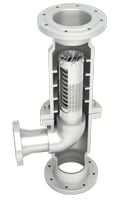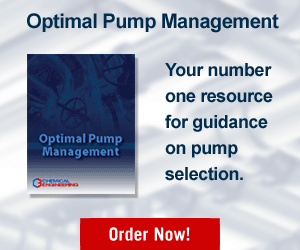| engineering how-to |
Distillation Optimization By Vapor Recompression
By Atul Choudhari and Pradnya Gune, Aker Powergas Private Ltd.; Jayant Divey, Reliance Industries Ltd.
Distillation is one of the most extensively used operations in the chemical process industries (CPI). It is a highly energy-intensive unit operation, and continuously rising energy costs make it imperative to look for ways to reduce energy requirements. Some energy-saving configurations can increase capital investment costs, so the benefits need to be weighed carefully. Various techniques, such as heat integration, heat pumps, thermal couplings and others have been employed to achieve energy reductions. Vapor-recompression-assisted distillation is one such technique to reduce energy consumption by utilizing the energy from the column overhead stream, with added external mechanical energy, to boil the bottom stream. This article illustrates the technique through an example of a typical C3-splitter (propane-propylene splitter) design wherein significant energy savings and operational benefits are achieved by using vapor recompression distillation. » |
 |
Achieving Excellence in Energy Efficiency
By Alan P. Rossiter, Rossiter & Associates and Beth Jones, LyondellBasell (ret.)
In today’s environmentally conscious world, industrial energy management is increasingly recognized as an essential business practice and economic necessity, rather than an on-again, off-again activity driven by energy prices and geopolitical crises. This article examines the key elements of excellence in energy efficiency, and explore ways of pursuing energy excellence. Four main types of opportunities provide the savings: operational improvements, effective maintenance, engineered improvements and new technologies. Included are experiences from several companies in the CPI that have made great strides in raising efficiency and reducing energy consumption. To support and maintain an effective energy-management system, it is important for CPI companies to establish a corporate culture that expects energy efficiency, motivates its employees, provides the organizational structure to facilitate savings and develops the tools to achieve efficiency. » |
|
 |
| |
| latest news |
|
|
 |
ADVERTISEMENT
Instant hot water at precisely controlled temperatures is at your fingertips
Energy efficient and reliable, Pick Direct Steam Injection Process Heaters deliver hot water on demand at your set temperature. Pick is the perfect choice for heat transfer applications such as jacketed heating, slurry heating, washdown/hose station, wastewater treatment, and product heating. Contact us to find out how Pick Heaters can reduce not only your energy bills, but your total operating costs.
|
|
| facts at your fingertips |
| Key Reactions for the Petrochemical Industry |
| A handful of compounds derived from natural gas and crude petroleum are converted into a vast array of industrial petrochemicals. Starting materials for most petrochemical intermediates include synthesis gas, ethylene, propylene, butadiene and BTX (benzene, toluene, xylenes). This reference provides an overview of the chemical routes and reactions required to manufacture these fundamental petrochemicals, as well as reactions for generating some of their immediate chemical derivatives. |
|
 |
|
| Technology Profile |
 |
Methyl tertiary-butyl ether (MTBE) is an organic compound used mainly as a fuel additive to enhance octane rating. It has low cost, high octane value, and is easy to incorporate into fuel blends. MTBE is produced via an etherification reaction between methanol and isobutylene in a liquid state. |
|
| from our bookstore |
| Instrumentation Volume 2: Improving Plant Operation, Safety and Control |
| This volume focuses on the selection and operation of instrumentation to reduce known CPI plant hazards. The detailed engineering articles focus on such critical topics as the use of instrumentation to improve hazard area classification and process hazards analysis, ensure reliable control valve performance, monitor and manage flame hazards, reduce the risk of dust explosions, manage so-called safety-instrumented systems, improve pipeline safety, reduce the risk of cybersecurity incidents and more. |
|
|
|
|
 |

|
|







